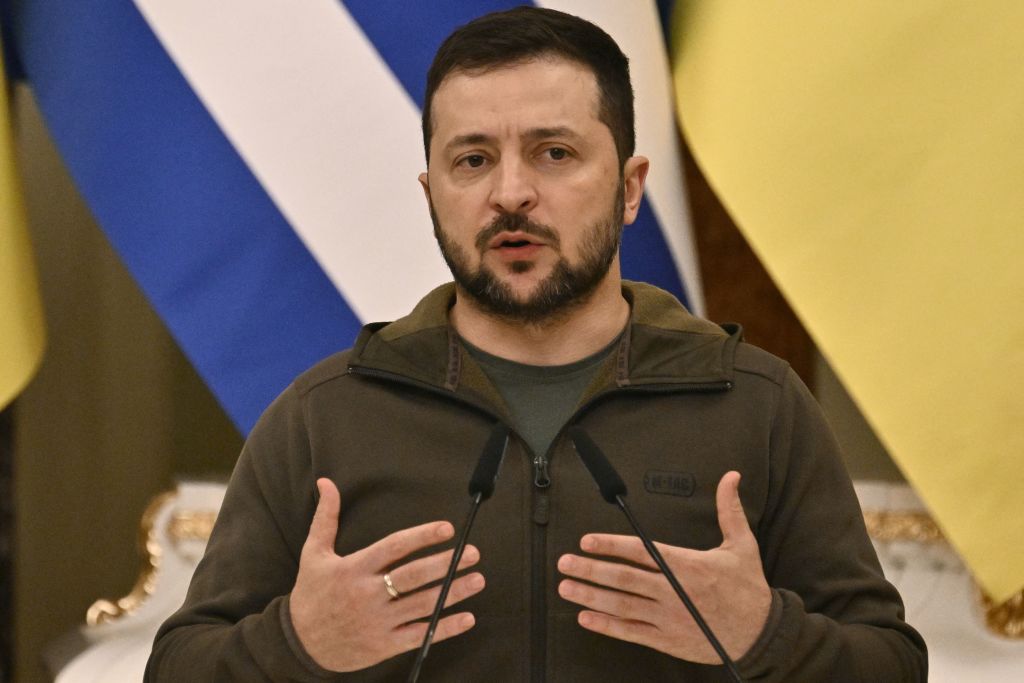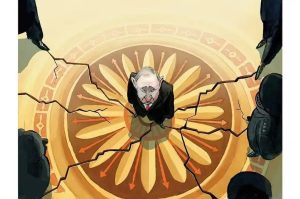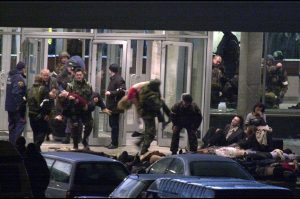The war in Ukraine is being fought on two fronts: the battlefield and the information space. From the beginning of Russia’s interference in Ukraine in 2014, the information war has been a key factor in the Kremlin’s strategy for victory. Because of this, Ukraine has taken a series of wartime measures to stabilize and protect itself, from political restrictions to media regulations. Some in the West have used these measures to paint Kyiv as undemocratic, but such rhetoric rings hollow.
What these criticisms miss is the fact that Ukraine, unlike other Western democracies, has been in a state of war for eight years. Like every other nation, from the United Kingdom during World War Two to the Union in the US Civil War, Ukraine has every right to enact measures that in peacetime would be considered illiberal. That does not make it unfree. Have some of Kyiv’s restrictions gone too far? Yes. But so, too, have wartime measures in most countries that are today free.
Every nation in a state of war is forced to address different threats, and Ukraine’s involves Russia fomenting unrest along ethnic and cultural lines. About 17 percent of the Ukrainian population is ethnically Russian (mostly in the east and south), and about 22 percent speak Russian as their first language. Russia used this to its advantage in 2014, supporting ethnic separatists in the Donbas, with many betraying Kyiv to side with Moscow. Ukraine’s former president Viktor Yanukovych, lest we forget, fled to Russia after his ouster. The issue of potential traitors within the Ukrainian political establishment continues today, with Volodymyr Zelensky having fired multiple officials.
Russia has long questioned the very identity of Ukraine, with Putin making this the cornerstone of his justification for invading. His July 2021 essay “On the Historical Unity of Russians and Ukrainians” is exhibit A. The Ukrainian people have suffered under Russian oppression for centuries, and attempts to cultivate a unique identity were regularly crushed by Moscow. Then there is Stalin’s genocide, the Holodomor, which still haunts the memories of Ukrainians.
Ukraine’s actions can therefore be broadly described as derussification — the removal of Russian influence from cultural and political spheres. This began in 2015 after the Revolution of Dignity and Russia’s initial intervention: Ukraine ratified anti-communist laws that renamed and removed of remnants of the country’s Soviet past, such as statues. The laws also banned symbols associated with communism and Nazism. The Communist Party, which chose not to rebrand itself, was eventually banned as a result.
In 2019, former Ukrainian president Petro Poroshenko approved a law that regulated language in Ukraine. The law is intended to promote the Ukrainian language by, for example, mandating that after elementary school, all classes be taught in Ukrainian. It also mandates the use of Ukrainian in a certain percentage of media (varying by media form) and in services (unless the patron asks otherwise). The law understandably drew criticism, largely because of concerns over free speech, as exceptions for Russian were not made, while they were made for European Union languages and English. With print media required to have a Ukrainian version, Russian-language Ukrainian print media might see larger than sustainable cost increases to publish both, potentially pricing Russian out of the market. Russian, however, was not banned from any form of media.
In 2019, Zelensky’s government pulled the plug on eight Russia-friendly media operations. Shortly after the start of the war and the declaration of martial law, 11 political parties with Russian sympathies were suspended, including the main pro-Russia party, Opposition Platform. Then, in May, all pro-Russia parties were banned. In June, the Vekhovna Rada passed a law that prohibited Russian nationals from printing books in Ukraine and the importation of Russian- or Belarusian-printed books.
More recently, there have been tensions between the Ukrainian Orthodox Church (UOC), which is under the Moscow Patriarchate, and the Ukrainian government. Elements of the UOC — which is distinct from the Orthodox Church of Ukraine — have shown Russian sympathies, including collaboration with occupation forces (though this is only a small portion of the UOC). Ukraine has responded by searching some of the UOC’s churches and monasteries, including Kyiv’s famous Pechersk Lavra, where “pro-Russian literature” was found. The government has since said it will put forward a new law that will restrict “religious organizations affiliated with centers of influence in the Russian Federation.” Some clergy have been sanctioned for such affiliations.
Returning to the accusation leveled against Ukraine — that these measures make the country undemocratic — a brief look at American history would be useful. Consider the actions of Abraham Lincoln during the Civil War. Like Ukraine, the very existence of the United States as we know it was contingent upon the outcome of the conflict. There were also Confederate sympathizers and anti-war activists sprinkled all over the North. To preserve the Union during this existential crisis, Lincoln suspended the writ of habeas corpus and allowed trial of citizens by military courts. Military officials could arrest those who publicly voiced sympathy for the Confederacy or anti-war sentiment.
Politicians were not exempt, as the case of Clement Vallandigham illustrates. Vallandigham was a member of Congress until shortly before his arrest in 1863. After giving a speech deemed to convey “his sympathies… with those in arms against the Government of the United States,” he was arrested, tried in a military court, convicted, and exiled. Lincoln, accused of abuse of power, defended himself, pointing out that in the North, “a jury too frequently [has] at least one member, more ready to hang the panel than to hang the traitor.” The normal system of justice would not suffice when the Union was at stake.
Lincoln knew that the suspension of traditionally sacrosanct rights was not ideal, but he also knew that those rights would be meaningless if the American experiment collapsed in the flames of rebellion. In a letter addressing his critics, he said that “he who dissuades one man from volunteering, or induces one soldier to desert, weakens the Union cause as much as he who kills a Union soldier in battle.” If wartime measures were not taken, there would be no way to prosecute such a man: “Must I shoot a simple-minded soldier boy who deserts, while I must not touch a hair of a wiley agitator who induces him to desert?”
Of course, this is not to compare Zelensky to Lincoln — Lincoln is on another plane of greatness altogether — but it is to point out that during its own existential crisis, America acted in ways not too dissimilar to Ukraine. One would be hard pressed to argue that the US is not a free, democratic nation today.
Ukraine will have a long process of reconstruction once the war ends, and that will be the test of its commitment to freedom and democracy. Some of its wartime measures have gone too far, and those should be rectified. But it is notable that most of the country’s major actions to date have been passed by the parliament, not by dictatorial decree. In fact, it is more surprising that Ukraine has respected freedom as much as it has, given its perilous situation. So cut Ukraine some slack. Give it the credit it deserves for maintaining a functioning democracy while facing Europe’s most devastating war since 1945.

























